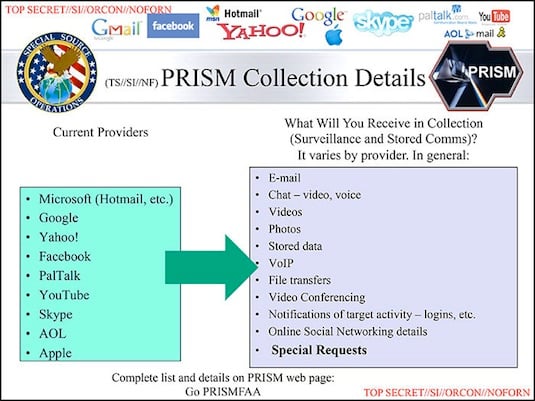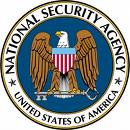Re: NSA monitoring all Verizon users
the always a bit overheated Escobar treatment . . .
Digital Blackwater rules
By Pepe Escobar
The judgment of Daniel "Pentagon Papers" Ellsberg is definitive; "There has not been in American history a more important leak than Edward Snowden's release of NSA material". And that includes the release of the Pentagon Papers themselves. Here is the 12-minute video by The Guardian where Snowden details his motives.
By now, everything swirling around the US National Security Agency (NSA) points to a black box in a black hole. The black box is the NSA headquarters itself in Fort Meade, Maryland. The black hole is an area that would include the suburbs of Virginia's Fairfax County near the CIA but mostly the intersection of the Baltimore Parkway and Maryland Route 32.
There one finds a business park a mile away from the NSA which Michael Hayden, a former NSA director (1999-2005) told Salon's Tim Shorrock is "the largest concentration of cyber power on the planet". [1] Hayden coined it "Digital Blackwater".
Here is a decent round up of key questions still not answered about the black hole. But when it comes to how a 29-year old IT wizard with little formal education has been able to access a batch of ultra-sensitive secrets of the US intelligence-national security complex, that's a no-brainer; it's all about the gung-ho privatization of spying - referred to by a mountain of euphemisms of the "contractor reliance" kind. In fact the bulk of the hardware and software used by the dizzying network of 16 US intelligence agencies is privatized.
A Washington Post investigation found out that US homeland security, counter-terror and spy agencies do business with over 1,900 companies. [2] An obvious consequence of this contractor tsunami - hordes of "knowledge" high-tech proletarians in taupe cubicles - is their indiscriminate access to ultra-sensitive security. A systems administrator like Snowden can have access to practically everything.
"Revolving door" does not even begin to explain the system. Snowden was one of 25,000 employees of Booz Allen Hamilton ("We are visionaries") for the past three months. [3] Over 70% of these employees, according to the company, have a government security clearance; 49% are top secret (as in Snowden's case), or higher. The former director of national intelligence Mike McConnell is now a Booz Allen vice president. The new director of national intelligence, the sinister-looking retired general James Clapper, is a former Booz Allen executive.
At least US - and world - public opinion may now have a clearer idea of how a Pashtun girl in Waziristan is obliterated by a "targeted strike". It's all a matter of this privatized NSA-collected meta-data and matrix multiplication leading to a "signature". The "terrorist" Pashtun girl of course may eventually morph in the near future into a dangerous tree-hugger or a vocal political protester.
It's all China's fault
True to form, as soon as Snowden revealed his identity US corporate media privileged shooting the messenger instead of poring over the message. That included everything from cheap character assassination to the usual former CIA asset spinning that in Washington many were looking at Snowden as an agent in a potential Chinese espionage plot.
Much has also been made of the John Le Carre-esque plot twist of Snowden leaving his tranquil life in Hawaii and flying to Hong Kong on May 20, because "they have a spirited commitment to free speech and the right of political dissent". Hong Kong-based blogger Wen Yunchao memorably described it as Snowden having "left the tiger's den and entered the wolf's lair". Yet Snowden's visa stamp at Chek Lap Kok airport lasts for 90 days - plenty of time to ponder the next move.
Since 1996, before the British handover to China, an extradition treaty applies between the tiger and the wolf. [4] The US Department of Justice is already surveying its options. It's important to remember that the Hong Kong judicial system is independent from China's - according to the Deng Xiaoping-conceptualized "one country, two systems". As much as Washington may go for extraditing Snowden, he may also apply for political asylum. In both cases he may stay in Hong Kong for months, in fact years.
The Hong Kong government cannot extradite anyone claiming he will be persecuted in his country of origin. And crucially, article 6 of the treaty stipulates, "a fugitive offender shall not be surrendered if the offence of which that person is accused or was convicted is an offence of a political character." Another clause stipulates that a fugitive shall not be surrendered if that implicates "the defense, foreign affairs or essential public interest or policy" of - guess who - the People's Republic of China.
So then we may have a case of Hong Kong and Beijing having to reach an agreement. Yet even if they decided to extradite Snowden, he could argue in court this was "an offence of a political character". The bottom line - this could drag on for years. And it's too early to tell how Beijing would play it for maximum leverage. A "win-win" situation from a Chinese point of view would be to balance its commitment to absolute non-interference in foreign domestic affairs, its desire not to rock the fragile bilateral relation boat, but also what non-pivoting move the US government would offer in return.
The ultimate Panopticon
The usual rabid right-wingers in the US predictably skip the fact of how Snowden does not see intelligence analysts - and even the US government, per se - as inherent "bad guys". [5] What he stressed is how they all work under a false premise; "If a surveillance program produces information of value, it legitimizes it ... In one step, we've managed to justify the operation of the Panopticon".
Oh yes, make no mistake; Snowden has carefully read his Michel Foucault (he also stressed his revulsion facing "the capabilities of this architecture of oppression").
Foucault's deconstruction of the Panopticon's architecture is now a classic (see it here in an excerpt of his 1975 masterpiece Discipline and Punish). The Panopticon was the ultimate surveillance system, designed by utilitarian philosopher Jeremy Bentham in the 18th century. The Panopticon - a tower surrounded by cells, a pre-Orwellian example of "architecture of oppression" - was not originally conceived for the surveillance of a prison, but of a factory crammed with landless peasants on forced labor.
Oh, but those were rudimentary proto-capitalist days. Welcome to the (savagely privatized) future, where the NSA black hole, "Digital Blackwater", lords over all as the ultimate Panopticon.
Notes:
1. Digital Blackwater: Meet the Contractors Who Analyze Your Personal Data, Alternet, June 10, 2013.
2. Top Secret America, Washington Post, June, 2010.
3. See here for company website.
4. See here for extradition treaty.
5. Code name 'Verax': Snowden, in exchanges with Post reporter, made clear he knew risks, Washington Post, June 10, 2013.
Pepe Escobar is the author of Globalistan: How the Globalized World is Dissolving into Liquid War (Nimble Books, 2007) and Red Zone Blues: a snapshot of Baghdad during the surge. His new book, just out, is Obama does Globalistan (Nimble Books, 2009).
He may be reached at pepeasia@yahoo.com.
2013 Asia Times Online
the always a bit overheated Escobar treatment . . .
Digital Blackwater rules
By Pepe Escobar
The judgment of Daniel "Pentagon Papers" Ellsberg is definitive; "There has not been in American history a more important leak than Edward Snowden's release of NSA material". And that includes the release of the Pentagon Papers themselves. Here is the 12-minute video by The Guardian where Snowden details his motives.
By now, everything swirling around the US National Security Agency (NSA) points to a black box in a black hole. The black box is the NSA headquarters itself in Fort Meade, Maryland. The black hole is an area that would include the suburbs of Virginia's Fairfax County near the CIA but mostly the intersection of the Baltimore Parkway and Maryland Route 32.
There one finds a business park a mile away from the NSA which Michael Hayden, a former NSA director (1999-2005) told Salon's Tim Shorrock is "the largest concentration of cyber power on the planet". [1] Hayden coined it "Digital Blackwater".
Here is a decent round up of key questions still not answered about the black hole. But when it comes to how a 29-year old IT wizard with little formal education has been able to access a batch of ultra-sensitive secrets of the US intelligence-national security complex, that's a no-brainer; it's all about the gung-ho privatization of spying - referred to by a mountain of euphemisms of the "contractor reliance" kind. In fact the bulk of the hardware and software used by the dizzying network of 16 US intelligence agencies is privatized.
A Washington Post investigation found out that US homeland security, counter-terror and spy agencies do business with over 1,900 companies. [2] An obvious consequence of this contractor tsunami - hordes of "knowledge" high-tech proletarians in taupe cubicles - is their indiscriminate access to ultra-sensitive security. A systems administrator like Snowden can have access to practically everything.
"Revolving door" does not even begin to explain the system. Snowden was one of 25,000 employees of Booz Allen Hamilton ("We are visionaries") for the past three months. [3] Over 70% of these employees, according to the company, have a government security clearance; 49% are top secret (as in Snowden's case), or higher. The former director of national intelligence Mike McConnell is now a Booz Allen vice president. The new director of national intelligence, the sinister-looking retired general James Clapper, is a former Booz Allen executive.
At least US - and world - public opinion may now have a clearer idea of how a Pashtun girl in Waziristan is obliterated by a "targeted strike". It's all a matter of this privatized NSA-collected meta-data and matrix multiplication leading to a "signature". The "terrorist" Pashtun girl of course may eventually morph in the near future into a dangerous tree-hugger or a vocal political protester.
It's all China's fault
True to form, as soon as Snowden revealed his identity US corporate media privileged shooting the messenger instead of poring over the message. That included everything from cheap character assassination to the usual former CIA asset spinning that in Washington many were looking at Snowden as an agent in a potential Chinese espionage plot.
Much has also been made of the John Le Carre-esque plot twist of Snowden leaving his tranquil life in Hawaii and flying to Hong Kong on May 20, because "they have a spirited commitment to free speech and the right of political dissent". Hong Kong-based blogger Wen Yunchao memorably described it as Snowden having "left the tiger's den and entered the wolf's lair". Yet Snowden's visa stamp at Chek Lap Kok airport lasts for 90 days - plenty of time to ponder the next move.
Since 1996, before the British handover to China, an extradition treaty applies between the tiger and the wolf. [4] The US Department of Justice is already surveying its options. It's important to remember that the Hong Kong judicial system is independent from China's - according to the Deng Xiaoping-conceptualized "one country, two systems". As much as Washington may go for extraditing Snowden, he may also apply for political asylum. In both cases he may stay in Hong Kong for months, in fact years.
The Hong Kong government cannot extradite anyone claiming he will be persecuted in his country of origin. And crucially, article 6 of the treaty stipulates, "a fugitive offender shall not be surrendered if the offence of which that person is accused or was convicted is an offence of a political character." Another clause stipulates that a fugitive shall not be surrendered if that implicates "the defense, foreign affairs or essential public interest or policy" of - guess who - the People's Republic of China.
So then we may have a case of Hong Kong and Beijing having to reach an agreement. Yet even if they decided to extradite Snowden, he could argue in court this was "an offence of a political character". The bottom line - this could drag on for years. And it's too early to tell how Beijing would play it for maximum leverage. A "win-win" situation from a Chinese point of view would be to balance its commitment to absolute non-interference in foreign domestic affairs, its desire not to rock the fragile bilateral relation boat, but also what non-pivoting move the US government would offer in return.
The ultimate Panopticon
The usual rabid right-wingers in the US predictably skip the fact of how Snowden does not see intelligence analysts - and even the US government, per se - as inherent "bad guys". [5] What he stressed is how they all work under a false premise; "If a surveillance program produces information of value, it legitimizes it ... In one step, we've managed to justify the operation of the Panopticon".
Oh yes, make no mistake; Snowden has carefully read his Michel Foucault (he also stressed his revulsion facing "the capabilities of this architecture of oppression").
Foucault's deconstruction of the Panopticon's architecture is now a classic (see it here in an excerpt of his 1975 masterpiece Discipline and Punish). The Panopticon was the ultimate surveillance system, designed by utilitarian philosopher Jeremy Bentham in the 18th century. The Panopticon - a tower surrounded by cells, a pre-Orwellian example of "architecture of oppression" - was not originally conceived for the surveillance of a prison, but of a factory crammed with landless peasants on forced labor.
Oh, but those were rudimentary proto-capitalist days. Welcome to the (savagely privatized) future, where the NSA black hole, "Digital Blackwater", lords over all as the ultimate Panopticon.
Notes:
1. Digital Blackwater: Meet the Contractors Who Analyze Your Personal Data, Alternet, June 10, 2013.
2. Top Secret America, Washington Post, June, 2010.
3. See here for company website.
4. See here for extradition treaty.
5. Code name 'Verax': Snowden, in exchanges with Post reporter, made clear he knew risks, Washington Post, June 10, 2013.
Pepe Escobar is the author of Globalistan: How the Globalized World is Dissolving into Liquid War (Nimble Books, 2007) and Red Zone Blues: a snapshot of Baghdad during the surge. His new book, just out, is Obama does Globalistan (Nimble Books, 2009).
He may be reached at pepeasia@yahoo.com.
2013 Asia Times Online









Comment